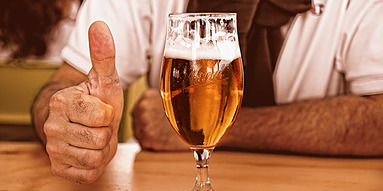Relaxing With Alcohol…It Feels Like The Perfect Solution
After a difficult day, the idea of sitting down with a glass of wine sounds like the perfect thing to relax and unwind. The warm belly and pleasant buzz that can come from indulging in an adult beverage or two definitely feels good. While it’s true that alcohol produces a euphoric feeling initially, that happy vibe only lasts when blood alcohol is between .02-.03% which equates to about 1 drink lasting 60 minutes for the average person. The negative physical effects quickly follow. In fact, alcohol is said to be bi-phasic, or producing a quick “high” followed by a longer “low”.
It’s Always Cocktail Hour Somewhere
Despite what we may think about alcohol being relaxing, it is actually a potent stimulator of the stress hormone, cortisol. Short term, cortisol can make you feel depressed, fatigued, and irritable. It can rob you of your libido and your fertility. You might notice more back pain, acne, and even weight gain.
Long-term, cortisol can depress your immune system and lead to other serious health complications including hypertension and metabolic changes. Unfortunately, the more we seek relaxation in alcohol, the more cortisol is released. The more cortisol released, the more stress we perceive in our environment, even when we are not drinking. This means that over time, we will be more and more inclined to need a drink to unwind. Thanks to the tolerance-building effects of cortisol, we will also be more inclined to drink a higher volume of alcohol every time we drink. The only way to break this cycle is to recognize that it can be a problem and simply try a different relaxation practice The next time you’d like to feel better after a long day you might want to try a walk outside, a yoga class, a few moments of stretching, or even a massage. All of these options will support the health of your body and mind without the high cost of cortisol.
References:
Addicott, M., Marsh-Richard, D., Mathias, C., & Dougherty, D. (2007). The Biphasic Effects of Alcohol: Comparisons of Subjective and Objective Measures of Stimulation, Sedation, and Physical Activity. Alcoholism: Clinical And Experimental Research, 31(11), 1883-1890.doi: 10.1111/j.1530-0277.2007.00518.x
Chronic drinking increases levels of stress hormones, leading to neurotoxicity. (2018). Retrieved from https://www.sciencedaily.com/releases/2010/09/100907163313.htm













